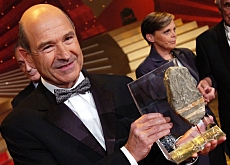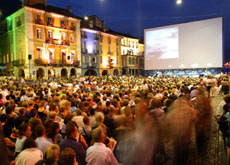Locarno’s mayor talks politics

Carla Speziali, Locarno's mayor and recent winner of a Swiss Award, tells swissinfo about her experiences of being a woman in politics.
She explains how her enthusiasm and commitment to the job have stood her in good stead.
Locarno, a town in the Italian-speaking canton of Ticino, is unusual in that its seven-member council has a majority of women. Men still largely dominate many local administrations in Switzerland.
Earlier this year Speziali, who is also a lawyer, won a Swiss Award for politics for her efforts to promote Locarno. These annual awards are given to personalities who have made their mark in their chosen fields.
Speziali, 44, is a member of the centre-right Radical Party. She was elected mayor of Locarno in 2004, the first female mayor in the town’s history.
She divides her professional time between the town hall and her law office.
swissinfo: How does it feel to run a largely female town council?
Carla Speziali: We’re an excellent team. We do our job with enthusiasm, energy, skill, and discipline. Each of us has precise responsibilities within our own department, but we never lose sight of the whole.
However, there are three male councillors in addition to the four women. Obviously, men are used to being in the majority, so the situation is new to them. Anyway, if we count the council’s chief-of-staff, there’s nearly an equal split…
swissinfo: Yvette Jaggi, the former mayor of Lausanne, said that women tend to think more about future generations than men. Do you agree?
C.S.: No, I don’t think men are incapable of taking a long-term approach. The main reason for this is very simple: forward thinking is a must for anyone who goes into politics, regardless of his or her gender.
Whoever wants to serve the community has to look far to the future and plan political actions accordingly.
swissinfo: How hard is it for a woman to be in politics?
C.S.: Being in politics is hard for everyone, men and women alike. Holding a public office takes so much commitment and dedication. Above all, though, you have to believe in what you do and in the role the people have given you.
In my view, politics is first and foremost a matter of ideals. That’s what made me choose politics and what motivates me. There are many challenges, and the problems get more and more complex, but I can’t imagine politics without passion and true conviction.
Of course, one also has to deal with stress, conflict, and different sensibilities. The ability to mediate and to hear every voice is crucial in my position as mayor.
swissinfo: When it comes to the number of women in parliament, Switzerland has slid from 22nd to 27th place. Even Afghanistan has done better…
C.S.: It’s not flattering for a place like Switzerland to be worse off than Afghanistan, a war-torn country where sex discrimination is still rampant. It does make you wonder why that is. But it’s also difficult to explain.
Women often have to juggle the roles of wife, mother and worker. It’s not at all easy to make time for politics too.
A woman who decides to go into politics has to be well organised. Otherwise, it’s practically impossible to devote time to family, career and politics. Women also have to be in a position to make that choice.
You have to be tough, I don’t deny that. For my part, I have to juggle my duties at the law firm and at the town hall. I also need time for my son.
swissinfo: Sometimes competition among women is very strong, and there is so much emphasis on being good enough, a concept that has never stopped men from climbing the political ladder.
C.L.: I’m a bit reluctant to get involved in this kind of discussion. Placing the accent on the conflict, real and presumed, among women just reinforces the stereotype that they just quarrel among themselves. I don’t agree with that and Locarno is the example that goes against that cliché.
Having different ideas and defending them is absolutely legitimate. The next step is to gather those ideas together for the common good. I have always experienced a lot of female solidarity. The affection I receive from women, but also men, is wonderful. It gives me so much energy.
It’s true that up to now women have always had to prove they’re better than men and to work twice as hard. Honestly, though, mediocrity and incompetence are gender-free.
swissinfo: Should women use the same power strategies as men to be successful?
C.L.: People have to be true to themselves and use their inner resources. I have never thought of politics in terms of power, but when a person reaches higher positions he or she has certain responsibilities.
I believe in dialogue, in sharing ideas, in listening and being open-minded. Those are basically the points on my compass, in everyday life and in politics. And they’ve never really steered me in the wrong direction.
swissinfo: How important is upbringing for learning about emancipation? You have a son…
C.S.: As a woman who’s always believed in emancipation, bringing up a boy is a huge responsibility, but mostly it’s a fabulous experience that’s helped me grow in so many ways.
Louis was very supportive when the Swiss Awards were coming out. When asked if he was proud of his mother, he said he was.
But he also said, “I’ve always been proud of my mother, even beforehand.” You can imagine how good it was to hear that!
swissinfo, Françoise Gehring in Locarno
Italian-speaking Locarno has a seven-member town council – four women and three men.
Four parties are represented: the centre-right Radical and Christian Democrats parties, the centre-left Social Democrats and far-right Lega dei Ticinesi.
The town has 14,949 inhabitants (8,003 women and 6,946 men.)
It hosts the annual Locarno film festival.
In January 2005, women held a quarter of seats on local councils in towns with more than 10,000 people.
Of the 121 councils of this size in Switzerland, 14 had elected women mayors.
No Swiss city with a population of more than 50,000 people had a female mayor.
The percentage of women councillors has increased by nearly 3% since 1997.
Carla Speziali, a member of the centre-right Radical Party, was elected in 2004 – the first female mayor in Locarno’s history.

In compliance with the JTI standards
More: SWI swissinfo.ch certified by the Journalism Trust Initiative











You can find an overview of ongoing debates with our journalists here . Please join us!
If you want to start a conversation about a topic raised in this article or want to report factual errors, email us at english@swissinfo.ch.